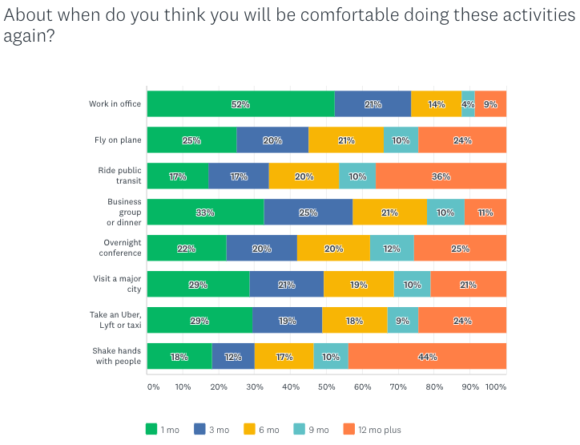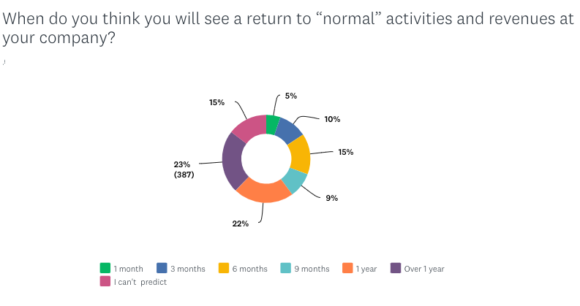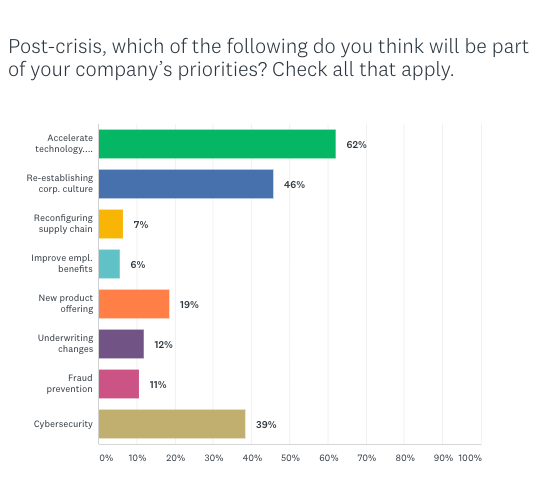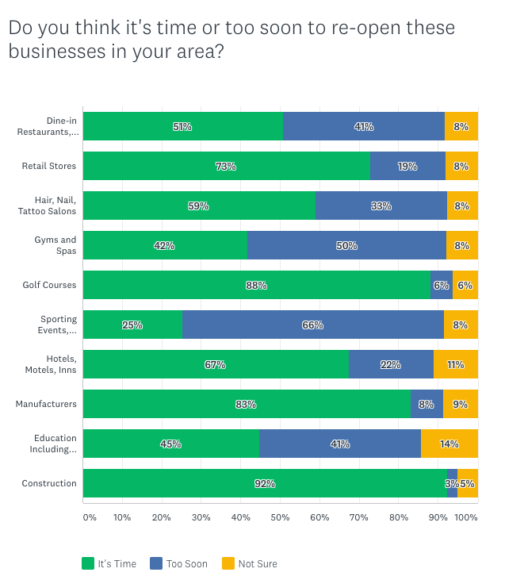Many property/casualty insurance professionals, most of whom have been working at home during the pandemic, may need some convincing not only to return to an office anytime soon but also to engage in typical business activities with colleagues and customers.
While a bare majority (52%) industrywide say they are comfortable returning to an office within a month, almost as many — 48% — say they prefer to wait from three months to a year, according to results from Wells Media Group’s Property/Casualty Insurance Industry Coronavirus Survey.
Industrywide, 21% say they prefer to wait three months, 14% say they prefer to wait 6 months, while 13% say they’d like to 9 to 12 months.
A higher percentage (61%) of those working in agencies and brokerages are open to returning to an office within a month.
The 2020 Property/Casualty Insurance Industry Coronavirus Survey captured responses from 1,704 individuals representing a cross section of the industry: 54% work in agencies and brokerages; 31% work for insurers or reinsurers; 10% are vendors to the industry (technology, claims, legal, etc.); and 5% work in other insurance-related organizations.
As revealed in an earlier report on the survey results, 78% of employees in the property/casualty insurance industry have worked from home more than half the time during the outbreak, while a majority, 60%, of all respondents have worked from home full-time, or 100% of the time. About 12% have been working from home 75% of the time and 6% have worked remotely 50% of the time.
A review of more than 1,300 individual comments in the survey indicates anxiety about respondents’ own health, and that of others, is top of mind among those worried about returning to an office.
“I’m in a high risk category and I have some concerns about being required to return to the office,” worries one respondent, reflecting a fear shared by a number of others.
“My employer will threaten my job if I don’t feel comfortable returning to the office. Their office layout was open and carried germs causing illness for everyone before. I think they will not care that this is worse,” comments another.
“I’m concerned about the push to return to normal (and to the office) before proper treatment/vaccines are available,” adds a worker. “I’m concerned about co-workers who haven’t taken it as seriously as I and may have had exposure without knowing it & then not being cautious around other higher-risk co-workers.”
“My own health concerns, and, living with a first responder. My family and I tend to disagree on the severity of the pandemic mainly because I have some health issues of my own. I also worry about returning to work and the safety of my employees and clients. I know we need to meet face-to-face again, but I am not in any rush to do this. Our remote work has not been perfect, but I feel as though it has been somewhat successful,” adds another.
According to the survey, 25% of respondents share their home with a first responder.
Another cited a feeling of lack of control over conditions outside of work that will influence the workplace. “Wondering if we are doing the right things. Seeing employees via social media out doing thing and with people that might affect our RTW program knowing that I can’t really do anything about it,” an insurance professional writes.
Engaging in Normalcy
If and when employees do return to an office, they may also need some convincing to engage with colleagues and customers, the survey found. It could take some time before many are again comfortable with typical interactions.
Greetings may be awkward. A high a percentage — 44% — say they won’t be comfortable shaking hands with people for a year or more.
Twenty-four percent prefer to wait three months before they attend an in-person group meeting or dinner; 29% say it will be six to nine months; and 11% say a year or more.
Twenty-one percent (21%) say they want to wait three months before flying again; 27% say six to nine months; 27% say more than a year.
Most employees are not expecting things in their own businesses to be back to normal right away. As many as 45% expect it could take a year or more for both activities and revenues to get back to where they were before the crisis. Another 24% expect it will take six or nine months before they see normal activities and revenues.
One of several respondents, who expect things to take time, cites concerns over the “inability to quickly return to the old ‘norm’ and/or uncertainty of new norm.”
Three-quarters (75%) say their firms have safety plans for a return to the office by employees. These plans include social distancing, mask requirements, staggered shifts, reconfigured workstations and other measures.
Several principals expressed concerns about the added costs of return-to-work plans. One worries that “new regulations on how to operate will increase costs,” while another cites concern over “new cleaning and disinfecting expenses.”
Most do not see major personnel changes happening, however, about 32% anticipate more hiring in information technology/technology and 26% see growth in sales positions.
They do have some expectations about what their companies will emphasize when they are welcomed back. Half (50%) see their companies prioritizing efforts to re-establish the corporate culture and even more (64%) see their firms expanding the use of technology.
“Reconnecting employees to on another,” is one person’s description of the coming return.
“Working to help employees readjust,” offers another.
“I think my company will likely strongly pivot towards the past in an attempt to capture calm,” is the picture a third paints.
Others see the bottom line being the focus. “Making up for lost income,” and “re-establishing lost business” are how two people see the priorities ahead, while another states the priority simply as “profitability.”
A few placed their concerns over returning to an office in a political context, expressing a distrust of public health advice while anticipating that some people will have trouble adjusting to a return to an office. One such comment follows:
“The response to COVID-19 has been blown so far out of proportion and scare tactics have been so widely used that I believe SOME people will not be able to adjust to what was previously considered a normal life, including a normal work life. I have no desire to return to work in an environment where I have to wear a useless mask, uselessly ‘sanitize’ surfaces repeatedly during my work day and engage in politically correct behavior, such as ‘social distancing,’ when it is clear even from the CDC that none of these things make a bit of difference in whether someone does or does not contract the coronavirus. I am ashamed of our country for being fooled by people with a thinly disguised political agenda and an obvious profit-seeking agenda.”
A fair number think they may not have the option of worrying about conditions back in an office. The survey found 35% industrywide think their employers will make remote work mandatory and another 42% think it is possible this will happen. Only 23% are confident that won’t happen.
Regarding agencies and brokerages, a smaller percentage (31%) think remote work is going to be required, while 30% do not think it will.
Other Businesses
Apart from whether they are comfortable with their own offices opening up, these insurance professionals have opinions on when it might be safe for other businesses to re-open.
Majorities are comfortable with these other businesses resuming operations: construction (92%), golf (87%), manufacturing (81%), retail (71%), hotels (66%) and even hair and nail salons (56%).
But majorities think it is too soon for gyms (53%) or sports events (69%) to start up again.
Education is one area where there is some uncertainty, with 45% saying it is too soon, 41% saying it’s time, and 14% saying they are not sure.
Insurance professionals are evenly split over whether it is time (48%) or too soon (48%) for indoor dining in restaurants to resume.
Related:
Topics Trends Agencies Property Market Property Casualty COVID-19 Casualty
Was this article valuable?
Here are more articles you may enjoy.







 Dubai Floods Expose Weaknesses to a Rapidly Changing Climate
Dubai Floods Expose Weaknesses to a Rapidly Changing Climate  Former Congressman Charged After Collision with State Trooper in Florida
Former Congressman Charged After Collision with State Trooper in Florida  Why New York’s Attorney General Objects to Trump’s Bond Insurer
Why New York’s Attorney General Objects to Trump’s Bond Insurer  Marsh McLennan Agency to Buy Fisher Brown Bottrell for About $316M
Marsh McLennan Agency to Buy Fisher Brown Bottrell for About $316M 

